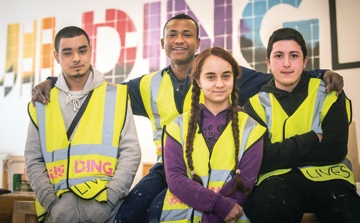You are viewing 1 of your 1 free articles
Building prospects
Building Lives operates construction training academies in five London boroughs. Simon Brandon visits its Tower Hamlets base to see the life-changing programme in action

The Building Lives Academy in Tower Hamlets, east London, is in a smart new building tucked in beside the roar of the A12.
Across the dual carriageway and a short hike north is the Olympic Park. Two years ago it was the largest construction site in Europe. Today, cranes spear the skyline on building sites all around the area. For the trainees hard at work in the academy, many of whom grew up locally, these sites are no longer just part of the landscape - they are opportunities.
Building Lives - Inside Housing’s partner on our Homes Work campaign to promote apprenticeships and training offered by social landlords (see box: Campaign aims and how to get involved) - is an award-winning social enterprise that trains and places apprentices within the construction industry. It runs training academies in five London boroughs and plans to open a further six in 2014.
Life skills
At the organisation’s Tower Hamlets base there are 65 trainees in the academy’s current intake, split into three groups. They are completing a part-time, 12-week course in basic construction that covers a range of skills, including tiling, plumbing, carpentry, painting and decorating. Around 50 will go on to become full-time apprentices on construction sites around the city. By the end of 2014, according to Sian Workman, development director at Building Lives, the organisation will be filling around 400 apprentice placements a year. Seventy-eight per cent will go on to sustained employment immediately afterwards, based on Building Lives’ success rate to date.
Two cohorts of trainees are studying at the academy on the day of Inside Housing’s visit, with guest editor Peter Bond, winner of Inside Housing and the Chartered Institute of Housing’s 2013 Rising Stars competition.
‘It’s obvious how much the Building Lives programme means to [the trainees] both in terms of having reason to get out of bed in the morning and also in regard to the positive effect it’s had on their overall well-being,’ he says.
Some trainees are obviously young teenagers, with one or two grey-haired students, too, although just one is a woman. Most of these trainees are in the penultimate week of their course, and will find out whether they have been selected for an apprenticeship within the next fortnight.
The practical training takes place on the academy’s ground floor, where a large room has been converted into a mini construction site. There are wooden booths waiting to be tiled, and doors waiting to be sanded and painted. In one corner three trainees are installing a sink.
There’s more to the course than practical skills, however. On the kitchen door is a reminder of the other criteria on which the trainees will be judged; things like timekeeping, motivation and having respect for the staff and each other.
‘We try to keep it as work-related as possible,’ says Deepak Chavda, Building Lives’ apprenticeship officer. ‘So they have early starts, scheduled tea breaks - no sneaking off for a fag as and when.’
Sometimes that extends to more pastoral care, too. Support is provided where trainees’ numeracy and literacy skills need polishing, as well as when stomachs need filling.
‘If they haven’t eaten in the morning, they can be disruptive,’ explains Mr Chavda. ‘So we provide tea, milk and bread so they can get some food in them. If you work in construction, you have to eat in the morning.’
Mr Chavda recalls one trainee who used to stuff himself with bread because he couldn’t afford to eat. Another former trainee, he says, used to come in late and smelling of cannabis; there were issues around gang affiliation, too. ‘But the last few weeks we saw he was making a real effort,’ he says. ‘He turned it around.’
Extra support
As someone who left school herself aged 15 with no qualifications, Ms Workman understands the value of training like this to people who might feel they have few prospects. ‘We are giving people real hope that even if you don’t go down the conventional route - good qualifications, university - you can still make something of your life,’ she says. ‘We are helping people get their lives on track. We are giving them a chance.’
The trainees at the academy today (see box: Meet the trainees) are determined to take that chance. Salah Mohamed, 25, started looking for a construction apprenticeship after he lost his job in retail.
‘There aren’t many apprenticeships about,’ he says. ‘There should be more apprenticeships, and more advice for young people.’
Now that he’s on the right track, he’s a very happy young man. ‘I found this and I feel like this is for me,’ he adds.
‘I have found my calling.’
Read about Pete Bond’s experience of visiting the site here.
Meet the trainees
Before starting pre-apprenticeship training with Building Lives, Salah Mohamed, 25, was working in retail. ‘In retail you get a job, you lose it, you get stuck in that cycle. This is a foundation. Even if I don’t get a job I’ve got those skills, I can work for myself, for my family. It gives us skills for life.
‘And it gives you a structure,’ he adds. ‘You get an apprenticeship and then you get a job. If you really want it, you can have it. This is a pathway to the future.’
For Saju Hoque, 17, the alternative to coming to the academy today was far less active. ‘I’d still be in bed sleeping,’ he says. ‘I’ve had to learn to get up early. Now I’m used to it.’
It’s much better than school, he adds. ‘Here they teach us like adults, not kids,’ he says. And he has learned some life lessons at the academy, too. ‘Now I know that if you want something, you have to build up to it,’ he adds. ‘That’s how it works.’
What is he building towards? ‘I want to be a site manager, like Deepak,’ he says.
‘He wants the white van too, don’t you?’ replies apprenticeship officer Deepak Chavda with a grin.
Also in this cohort is the group’s only female member, 16-year-old Helen Collyer. Building Lives says 10 per cent of its onsite apprentices are female compared with a national average of 1 per cent.
‘I’m going to one day hopefully start my own business,’ says Ms Collyer.
‘My brother wants to do an apprenticeship in carpentry so we’ll do that together.’
Her time at the academy has furnished her with conviction as well as construction skills: ‘I feel more confident now that I’m going to get a job,’ Ms Collyer says. ‘Before, I was in sixth-form college doing subjects that I wasn’t really sure where they were taking me. This is much better. I feel happier now.’
Ian Woodward, 35, had been unemployed for two years and on benefits when he heard about the Building Lives programme through his Jobcentre.
‘It’s a good opportunity for people who have been out of work for a while,’ he says. ‘A good chance to learn a trade. I would have done anything to get into work, but I really like construction now.’
The course has proved a useful transition back into employment, too. ‘I’ve been unemployed for a while,’ Mr Woodward says. ‘When you’re unemployed you tend to sit in a rut and get stagnant. You fall out of the loop a bit.So getting back into work habits, like getting up early - that has helped.’
His goal, he says, is simple: to get back into work. ‘I just want some employment first,’ he says. ‘Then I can start thinking about getting into a trade.’
Sitting next to him is Connor McCluskey, 20. He had been unemployed for five months before starting the course here. ‘I’ve been a labourer on sites in the past, so I was aware of the trade, but it was completely unskilled,’ he says. ‘It wasn’t going anywhere.
‘I just want to be employed in a stable job, really,’ Mr McCluskey adds, echoing his fellow trainee. ‘That’s all I’m worried about.’
When this issue’s guest editor, Peter Bond, asks what difference the training has made to his life, Mr McCluskey’s face lights up. ‘My personal relationships have become better,’ he says. ‘A lot changed when I stopped working, and it’s gone back to normal now. People have got off my back - my family, my girlfriend. It’s better. And I’ve kept out of trouble, too.’
How does it work?
Building Lives works initially with social landlords in an area to identify opportunities for apprentice placements. Apprentices can be referred, for example by a Jobcentre, or apply direct.
Each apprenticeship lasts 16 months, and during that time the apprentice will work on a number of sites for a variety of companies. Of the apprentices that start, 85 per cent will complete the placement.
‘The apprentices get exposure to working for a number of different companies on different sites, and we are exposing them to companies that might want to take them on,’ says Sian Workman, Building Lives’ director of development.
Crucially, while each contractor pays Building Lives for the use of their apprentices, the latter are employed for the length of their apprenticeship by Building Lives.
Set up in 2010 by Steve Rawlings, chief executive of construction firm Lakehouse, Building Lives is funded by the Skills Funding Agency and Construction Industry Training Board, but most of its income comes from contractors who pay £50 to £65 a day for each apprentice.
‘If you’re a SME [small or medium enterprise] you couldn’t afford that investment in someone,’ explains Ms Workman. ‘We’re not just helping the apprentices, we are helping smaller businesses source their fresh talent for the future.’
In Tower Hamlets, the organisation’s main housing sector partner is 9,000-home Poplar Harca.
‘We currently have 80 residents signed up to Building Lives and many of them have already passed the first level of training,’ says Babu Bhattacherjee, director of communities and neighbourhoods at Poplar Harca. ‘We’re delighted to be partnering with Building Lives in Tower Hamlets and look forward to supporting our residents in grabbing the opportunities this will provide.’
Campaign aims and how to get involved
- For residential developers across the UK to publicly state the number of apprenticeships they are providing on building site hoardings
- For housing associations and councils to pledge how many apprenticeships and training opportunities they will provide directly and through their supply chains in 2014/15
- To support the creation of a web resource by Inside Housing that schools and colleges can use to find out about apprenticeships and training opportunities offered by UK housing providers
To find out more about the campaign and how to get involved, visit www.insidehousing.co.uk/homeswork or to sign up, email gene.robertson@insidehousing.co.uk










